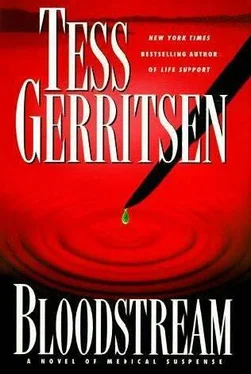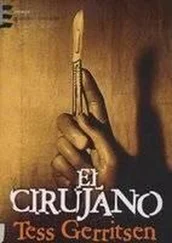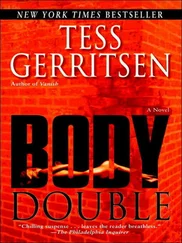He didn’t answer; he just kept rocking on the bed.
“I really need to know this, Taylor. Where did you two hang out?” He took in a shaky breath. “With-with the other kids.” “Where?”
“I don’t know! All over.”
“In the woods? At someone’s house?”
He stopped rocking, and for a moment she thought he hadn’t heard the last question. Then he raised his head and looked at her. “The lake.’
Locust Lake. It was the center of all activity in Tranquility, the place for picnics and swim races, for boaters and fishermen. Without it, there would be no summer visitors, no flow of money. The town itself would not exist.
It all has something to do with the lake, she thought suddenly. Water and rainfall. Floods and bacteria.
The night the water glowed.
“Taylor,” she said, “did you and Scotty both swim in the lake?” He nodded.
“Every day.”
The town meeting was scheduled for seven-thirty and by seven-fifteen, every seat in the high school cafeteria was filled. People were crowding into the aisles, lining up along the walls, and spilling out the rear doors into the cold wind.
From where Claire was standing, off to the side, she had a good view of the speakers’ table at the front. There Lincoln, Fern Cornwallis, and the chairman of the Town Board of Selectmen, Glen Ryder, were seated. The five members of the board were clustered in the front row.
Claire recognized many of the faces in the audience. Most of them were other parents, whom she’d met at high school functions. She also saw a number of her colleagues from Knox Hospital. The dozen teenagers in attendance had chosen to stand at the rear of the cafeteria, and were tightly clustered together as though to ward off attack by their elders.
Glen Ryder banged his gavel, but the crowd was too large, too agitated, to hear him. The frustrated Ryder had to climb onto a chair and yell: “This meeting will come to order now!”
The cafeteria at last fell silent, and Ryder continued. “I know there aren’t enough seats for everyone in here. I know there are people outside who are upset about having to stand in eight-degree weather. But the fire chief says we’ve already exceeded this room’s occupancy limit. We just can’t allow anyone else to enter, unless someone else exits first.”
“Seems to me some of those kids in the back could leave and make room for adults,” a man grumbled.
One of the teenagers retorted: “We’ve got a right to be here too!”
“You kids’re the reason we’re here in the first place!”
“If you’re going to talk about us, then we want to hear what you’re saying!”
Half a dozen people started to speak at once.
“No one’s being kicked out of here!” yelled Ryder. “It’s a public meeting, Ben, and we can’t exclude people. Now let’s get on with it.” Ryder looked at Lincoln.
“Chief Kelly, why don’t you bring us up to date with the problems in town.”
Lincoln rose to his feet. The last few days had drained him, both physically and emotionally, and it showed in the drooping slope of his shoulders. “It hasn’t been a good month,” he said. A typical Lincoln Kelly understatement. “What everyone seems to focus on are the murders. The shooting at the high school on November second, and then the Braxtons on November fifteenth. That’s two murders in two weeks. What scares me even more is, I don’t think we’ve seen the worst of it yet. Last night, my officers responded to eight different calls involving juveniles assaulting others. I’ve never seen this before. I’ve been a cop in this town for twenty-two years. I’ve seen minor crime waves come and go. But what I’m seeing now-kids trying to hurt each other, kill each other-trying to kill the people they love…“ He shook his head and sat down without another word.
“Miss Cornwaffis?” said Ryder.
The high school principal rose to her feet. Fern Cornwallis was a handsome woman, and she had taken pains to look her best tonight. Her blond hair was swept into a gleaming French twist, and she was one of the few women in the room who’d bothered to apply makeup. But that touch of bright lipstick only emphasized the anxious pallor of her face.
“I want to echo everything Chief Kelly just said. What’s happening in this town-the anger, the violence-I’ve never seen it before, either. And it’s not just a problem in the school. It’s also a problem in your homes. I know these children! I’ve watched them grow up. I’ve seen them around town, in the school hallways. Or in my office, as the occasion warranted. And the ones who are getting into fights now, none of them are kids I would have labeled troublemakers. None of them gave any hint, in past years, of being violent. But suddenly I find I don’t know these children anymore. I don’t recognize them.”
She paused and swallowed hard. “I’m afraid of them,” she said quietly.
“So whose fault is it?” yelled Ben Doucette.
“We’re not saying it’s anyone’s fault,” Fern said. “We’re just trying to understand why this is happening. Between our school and the middle school, we’ve brought in five new guidance counselors on an emergency basis. The high school has a district psychologist, Dr. Lieberman, working intensively with our staff. Trying to come up with a plan of action.”
Ben stood up. A sour-faced bachelor in his fifties, he had lost an arm in Vietnam, and he was always clutching the stump with his good hand, as though to emphasize his sacrifice. “I can tell you what the problem is,” he said. “It’s the same problem we’ve got all over this country. No goddamn discipline. When I was thirteen, you think I’d have dared to pick up a knife, threaten my mother?
My old man woulda whapped me up the side of the head.”
“What are you suggesting, Mr. Doucette?” said Fern. “That we spank fourteen-year-olds?”
“Why not?”
“Try it!” yelled one of the teenage boys, and he was joined by the other kids in a chorus of jeers: “Try it, try it, try it!”
The meeting was out of control. Lincoln stood up, raising his hand in a plea for order. It was a measure of the respect the town held for him that the crowd finally quieted down to hear him speak.
“It’s time to talk about realistic solutions,” he said.
Jack Reid stood up. “Can’t talk about solutions till we talk about why it’s happening in the first place. I hear from my boys that it’s the new kids in school, the ones who moved here from other cities, who’re causing most of the problems. Starting up gangs, maybe bringing in drugs.”
Lincoln’s response was lost in a sudden crescendo of voices. Claire could see the frustration in his face, the deepening flush of anger.
“This is not a problem from away,” said Lincoln. “This crisis is local. It’s our problem, and our kids getting into trouble.”
“But who got them started?” said Reid. “Who got ‘em going? Some folks just don’t belong here!”
Glen Ryder’s gavel banged again and again, to no avail. Jack Reid had pushed a hot button with this crowd, and now everyone was yelling at once.
A woman’s voice cut through the bedlam. “What about the rumors of a centuries-old Satanic cult?” said Damaris Horne, rising to her feet. It was hard to miss that wild mane of blond hair. Also hard to miss were the interested glances men cast her way. “We’ve all heard about those old bones they dug up by the lake. I understand it was a mass murder. Maybe even a ritual slaying.”
“That was over a hundred years ago,” said Lincoln. “It’s completely unrelated.”
“Maybe not. New England has a long history of Satanic cults.”
Lincoln was fast losing control of his temper. “The only cult around here,” he shot back, “is the one you made up for your trashy tabloid!”
Читать дальше
Конец ознакомительного отрывка
Купить книгу












